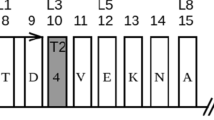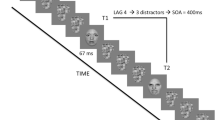Abstract
Practitioners with years of mindfulness training (MT) have a reduced attentional blink (AB), relative to novices and non-practitioners. There is still a lack of evidence regarding the impact of relatively short-term intensive traditional MT on AB. Moreover, it is unknown which component(s) of mindfulness underlie mindfulness-associated reductions in AB. Eighty-nine Chinese subjects were randomized into a MT group (N = 44) and a control (CON) group (N = 45). The participants in the CON group were waitlisted for the opportunity to participate in the training program during the 8 weeks that the MT group underwent training. Before (pretest) and after (posttest) the MT program, the subjects completed the Five-Facet Mindfulness Questionnaire (FFMQ), Peace-of-mind questionnaire (POM), and an AB task. Ultimately, 73 participants (MT group/CON group: 35/38) completed the study. From the pretest to the posttest, the MT group exhibited increases in FFMQ scores (total scores, observing subscores, and non-reactivity subscores) and POM scores, as well as improved accuracy in the AB task and a reduction in the lag-1 sparing effect. Increases in T2 accuracy in the AB correlated with improved non-reactivity. These findings broaden our understanding of the association between mindfulness and AB, and support the supposition that the skill of mindful non-reactivity plays an important role in reducing AB.




Similar content being viewed by others
Data Availability
The datasets generated during and/or analysed during the current study are available from the corresponding author on reasonable request.
References
Akyürek, E. G., & Hommel, B. (2005). Target integration and the attentional blink. Acta Psychologica, 119, 305–314. https://doi.org/10.1016/j.actpsy.2005.02.006.
American Psychiatric Association. (1994). Diagnostic and statistical manual of mental disorders, 4th Edn. Washington, DC: American Psychiatric Association.
Anicha, C. L., Ode, S., Moeller, S. K., & Robinson, M. D. (2012). Toward a cognitive view of trait mindfulness: Distinct cognitive skills predict its observing and nonreactivity facets. Journal of Personality, 80(2), 255–285. https://doi.org/10.1111/j.1467-6494.2011.00722.x.
Baer, R. A., Smith, G. T., Hopkins, J., Krietemeyer, J., & Toney, L. (2006). Using self-report assessment methods to explore facets of mindfulness. Assessment, 13(1), 27–45. https://doi.org/10.1177/1073191105283504.
Bohlmeijer, E., Prenger, R., Taal, E., & Cuijpers, P. (2010). The effects of mindfulness-based stress reduction therapy on mental health of adults with a chronic medical disease: A meta-analysis. Journal of Psychosomatic Research, 68(6), 539–544. https://doi.org/10.1016/j.jpsychores.2009.10.005.
Cardaciotto, L., Herbert, J. D., Forman, E. M., Moitra, E., & Farrow, V. (2008). The assessment of present-moment awareness and acceptance: The Philadelphia mindfulness scale. Assessment, 15(2), 204–223. https://doi.org/10.1177/1073191107311467.
Chun, M. M., & Potter, M. C. (1995). A two-stage model for multiple target detection in rapid serial visual presentation. Journal of Experimental Psychology: Human Perception and Performance, 21(1), 109–127.
Colzato, L. S., Sellaro, R., Samara, I., Baas, M., & Hommel, B. (2015). Meditation-induced states predict attentional control over time. Consciousness and Cognition, 37, 57–62. https://doi.org/10.1016/j.concog.2015.08.006.
Deng, Y. Q., Liu, X. H., Rodriguez, M. A., & Xia, C. Y. (2011). The five facet mindfulness questionnaire: Psychometric properties of the Chinese version. Mindfulness, 2(2), 123–128. https://doi.org/10.1007/s12671-011-0050-9.
Deng, Y. Q., Li, S., & Tang, Y. Y. (2012). The relationship between wandering mind, depression and mindfulness. Mindfulness, 5(2), 124–128. https://doi.org/10.1007/s12671-012-0157-7.
Desbordes, G., Gard, T., Hoge, E. A., Hölzel, B. K., Kerr, C., Lazar, S. W., Olendzki, A., & Vago, D. R. (2015). Moving beyond mindfulness: Defining equanimity as an outcome measure in meditation and contemplative research. Mindfulness, 6(2), 356–372. https://doi.org/10.1007/s12671-013-0269-8.
Di Lollo, V., Kawahara, J., Ghorashi, S. M. S., & Enns, J. T. (2005). The attentional blink: Resource depletion or temporary loss of control? Psychological Research Psychologische Forschung, 69, 191–200.
Dux, P. E., & Marois, R. (2009). The attentional blink: A review of data and theory. Attention, Perception & Psychophysics, 71, 1683–1700. https://doi.org/10.3758/APP.71.8.1683.
Fabio, R. A., & Towey, G. E. (2018). Long-term meditation: The relationship between cognitive processes, thinking styles and mindfulness. Cognitive Processing, 19(1), 73–85. https://doi.org/10.1007/s10339-017-0844-3.
Faul, F., Erdfelder, E., Lang, A. G., & Buchner, A. (2007). G*power 3: A flexible statistical power analysis program for the social, behavioral, and biomedical sciences. Behavior Research Methods, 39(2), 175–191. https://doi.org/10.3758/bf03193146.
Giesbrecht, B., Sy, J. L., & Lewis, M. K. (2009). Personal names do not always survive the attentional blink: Behavioral evidence for a flexible locus of selection. Vision Research, 49(10), 1378–1388.
Hadash, Y., Segev, N., Tanay, G., Goldstein, P., & Bernstein, A. (2016). The decoupling model of equanimity: Theory, measurement, and test in a mindfulness intervention. Mindfulness, 7(5), 1214–1226. https://doi.org/10.1007/s12671-016-0564-2.
Hasenkamp, W., & Barsalou, L, W. (2012). Effects of meditation experience on functional connectivity of distributed brain networks. Frontiers in Human Neuroscience. 6. https://doi.org/10.3389/fnhum.2012.00038.
Hommel, B., & Akyürek, E. G. (2005). Lag-1 sparing in the attentional blink: Benefits and costs of integrating two events into a single episode. Quarterly Journal of Experimental Psychology Section A: Human Experimental Psychology, 58, 1415–1433. https://doi.org/10.1080/02724980443000647.
Kabat-Zinn, J. (1990). Full catastrophe living: Using the wisdom of your mind and body to face stress, pain, and illness. New York: Delacorte.
Kabat-Zinn, J. (2003). Mindfulness-based interventions in context: Past, present, and future. Clinical Psychology: Science and Practice, 10(2), 144–156. https://doi.org/10.1093/clipsy.bpg016.
Lagroix, H. E. P., Di Lollo, V., & Spalek, T. M. (2018). The attentional blink: Why does Lag-1 sparing occur when the dependent measure is accuracy, but Lag-1 deficit when it is RT? Psychological Research Psychologische Forschung, 83, 1778–1797. https://doi.org/10.1007/s00426-018-1026-3.
Lee, Y. C., Lin, Y. C., Huang, C. L., & Fredrickson, B. L. (2013). The construct and measurement of peace of mind. Journal of Happiness Studies, 14(2), 571–590. https://doi.org/10.1007/s10902-012-9343-5.
Lindsay, E. K., & Creswell, J. D. (2017). Mechanisms of mindfulness training: Monitor and acceptance theory (MAT). Clinical Psychology Reviews, 51, 48–59. https://doi.org/10.1016/j.cpr.2016.10.011.
Liu, X., Xu, W., Wang, Y., Williams, J. M., Geng, Y., Zhang, Q., et al. (2015). Can inner peace be improved by mindfulness training: A randomized controlled trial. Stress and Health, 31, 245–254. https://doi.org/10.1002/smi.2551.
Lutz, A., Slagter, H. A., Dunne, J. D., & Davidson, R. J. (2008). Attention regulation and monitoring in meditation. Trends in Cognitive Sciences, 12(4), 163–169. https://doi.org/10.1016/j.tics.2008.01.005.
MacLean, M. H., & Arnell, K. M. (2012). A conceptual and methodological framework for measuring and modulating the attentional blink. Attention, Perception, & Psychophysics, 74(6), 1080–1097.
Marois, R., & Ivanoff, J. (2005). Capacity limits of information processing in the brain. Trends in Cognitive Sciences, 9(6), 296–305. https://doi.org/10.1016/j.tics.2005.04.010.
Martens, S., & Wyble, B. (2010). The attentional blink: Past, present, and future of a blind spot in perceptual awareness. Neuroscience and Biobehavioral Reviews, 34(6), 947–957. https://doi.org/10.1016/j.neubiorev.2009.12.005.
Martens, S., Elmallah, K., London, R., & Johnson, A. (2006). Cuing and stimulus probability effects on the P3 and the AB. Acta Psychologica, 123(3), 204–218.
Moore, A., & Malinowski, P. (2009). Meditation, mindfulness and cognitive flexibility. Consciousness and Cognition, 18(1), 176–186.
Nieuwenstein, M. R., Chun, M. M., van der Lubbe, R. H. J., & Hooge, I. T. C. (2005). Delayed attentional engagement in the attentional blink. Journal of Experimental Psychology-Human Perception and Performance, 31(6), 1463–1475. https://doi.org/10.1037/0096-1523.31.6.1463.
Olivers, C. N., & Meeter, M. (2008). A boost and bounce theory of temporal attention. Psychological Review, 115, 836–863.
Potter, M. C., Chun, M. M., Banks, B. S., & Muckenhoupt, M. (1998). Two attentional deficits in serial target search: The visual attentional blink and an amodal task-switch deficit. Journal of Experimental Psychology: Learning, Memory, and Cognition, 24, 979–992. https://doi.org/10.1037/0278-7393.24.4.979.
Raymond, J. E., Shapiro, K. L., & Arnell, K. M. (1992). Temporary suppression of visual processing in an RSVP task: An attentional blink? Journal of Experimental Psychology: Human Perception and Performance, 18(3), 849–860.
Roca, P., & Vazquez, C. (2020). Brief meditation trainings improve performance in the emotional Attentional blink. Mindfulness, 11(7), 1613–1622. https://doi.org/10.1007/s12671-020-01374-x.
Shapiro, K. L., Arnell, K. M., & Raymond, J. E. (1997). The attentional blink. Trends in Cognitive Sciences, 1(8), 291–296.
Shapiro, S. L., Carlson, L. E., Astin, J. A., & Freedman, B. (2006). Mechanisms of mindfulness. Journal of Clinical Psychology, 62(3), 373–386. https://doi.org/10.1002/jclp.20237.
Slagter, H. A., Lutz, A., Greischar, L. L., Francis, A. D., Nieuwenhuis, S., Davis, J. M., et al. (2007). Mental training affects distribution of limited brain resources. PLoS Biology, 5(6), 1228–1235.
Snir, G., & Yeshurun, Y. (2017). Perceptual episodes, temporal attention, and the role of cognitive control: Lessons from the attentional blink. Progress in Brain Research, 53–73. https://doi.org/10.1016/bs.pbr.2017.07.008.
Taatgen, N. A., Juvina, I., Schipper, M., Borst, J., & Martens, S. (2009). Too much control can hurt: A threaded cognition model of the attentional blink. Cognitive Psychology, 59, 1–29.
van Leeuwen, S., Muller, N. G., & Melloni, L. (2009). Age effects on attentional blink performance in meditation. Consciousness and Cognition, 18(3), 593–599. https://doi.org/10.1016/j.concog.2009.05.001.
van Vugt, M. K., & Slagter, H. A. (2014). Control over experience? Magnitude of the attentional blink depends on meditative state. Consciousness and Cognition, 23, 32–39. https://doi.org/10.1016/j.concog.2013.11.001.
Visser, T. A. W., Bischof, W. F., & Di Lollo, V. (1999). Attentional switching in spatial and nonspatial domains: Evidence from the attentional blink. Psychological Bulletin, 125, 458–469. https://doi.org/10.1037/0033-2909.125.4.458.
Wang, Y., & Luo, F. (2019). Meditation training and measures of meditation state. Chinese Journal of Behavioral Medicine and Brain Science, 28(2), 177–182.
Wang, Y., Xu, W., & Luo, F. (2016). Emotional resilience mediates the relationship between mindfulness and emotion. Psychological Reports, 118(3), 725–736. https://doi.org/10.1177/0033294116649707.
Wang, Y., Xu, W., Zhuang, C., & Liu, X. (2017). Does mind wandering mediate the association between mindfulness and negative mood? A preliminary study. Psychological Reports, 120(1), 118–129. https://doi.org/10.1177/0033294116686036.
Wang, Y., Qi, Z., Hofmann, S. G., Si, M., Liu, X., & Xu, W. (2019). Effect of acceptance versus attention on pain tolerance: Dissecting two components of mindfulness. Mindfulness, 10(7), 1352–1359. https://doi.org/10.1007/s12671-019-1091-8.
Willems, C., Saija, J. D., Akyürek, E. G., & Martens, S. (2016). An individual differences approach to temporal integration and order reversals in the attentional blink task. PLoS One, 11, 1–10. https://doi.org/10.1371/journal.pone.0156538.
Wyble, B., Potter, M. C., Bowman, H., & Nieuwenstein, M. (2011). Attentional episodes in visual perception. Journal of Experimental Psychology: General, 140, 488–505.
Zhou, L., Ding, J., & Zhou, K. (2020). Categorical similarity modulates temporal integration in the attentional blink. Journal of Vision, 20(4), 9. https://doi.org/10.1167/jov.20.4.9.
Zou, Y., Li, P., Hofmann, S, G., & Liu, X. (2020). The mediating role of non-reactivity to mindfulness training and cognitive flexibility: A randomized controlled trial. Frontiers in Psychology, 11, https://doi.org/10.3389/fpsyg.2020.01053
Acknowledgements
This work was supported by the NNSF (National Natural Science Foundation of China) under Grant (31970926) to Fei Luo; the NNSF under grant (31271092) to Jinyan Wang; the NNSF grant (31671140) to Ning Wang; the Scientific Foundation of Institute of Psychology, Chinese Academy of Sciences (Y9CX441005) to Yuzheng Wang; grants from CAS Key Laboratory of Mental Health, Institute of Psychology (KLMH 2014G01, KLMH2016K02) and a grant from the initiation fund of the CAS/SAFEA International Partnership Program for Creative Research Teams (Y2CX131003).
Author information
Authors and Affiliations
Corresponding author
Ethics declarations
Conflict of Interest
On behalf of all authors, the corresponding author states that there is no conflict of interest.
Ethical Approval
All procedures performed in studies involving human participants were in accordance with the ethical standards of the Institute of Psychology and with the 1964 Helsinki declaration and its later amendments or comparable ethical standards. No adverse events were reported in this study.
Informed Consent
Informed consent was obtained from all individual participants.
Additional information
Publisher’s Note
Springer Nature remains neutral with regard to jurisdictional claims in published maps and institutional affiliations.
Rights and permissions
About this article
Cite this article
Wang, Y., Xiao, L., Gong, W. et al. Mindful non-reactivity is associated with improved accuracy in attentional blink testing: A randomized controlled trial. Curr Psychol 41, 8908–8920 (2022). https://doi.org/10.1007/s12144-021-01377-4
Accepted:
Published:
Issue Date:
DOI: https://doi.org/10.1007/s12144-021-01377-4




